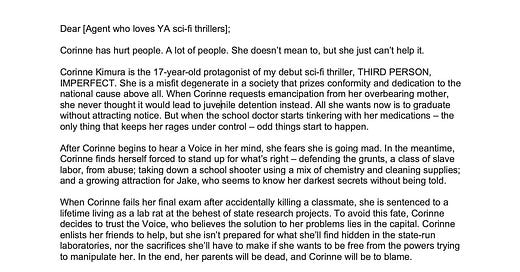Book title naming example 1: the YA sci-fi thriller that needs to stretch across four books
Corinne has hurt people.
For the first five years of my professional life, I supported myself as a copywriter, penning “heds” for fashion magazines and banging out copy for Victoria Secret catalogues from a set of cubicles that the higher-ups called “the stable” because there were so many of us freelance writers working there.
It was at Victoria’s Secret that I first discovered that I had a knack for naming things, and it was also where I learned that “namer” was a paying job.
I joined the invisible army known as the “Verbal Identity Department” back in 2010 at a giant branding agency, and I’ve been working freelance as a corporate namer ever since. At first, I didn’t realize that my ability to generate one hundred viable names for adult diapers in one hour would ever come in handy in my creative writing life, but it has. Whether it’s naming the collected essays of a coaching client or the company where the main character works in one of my own books—I apply the same rubrics and considerations we use in corporate naming to whatever project is at hand.
Today, we’re going to look at how to apply such considerations to a submission that came in from a reader we’ll call E., who wrote me about her YA dystopian thriller set in a juvenile detention center 100 years in the future. E.’s current working title is: Third Person, Imperfect since, (in her words) “a core part of the story is the odd voice (ahem, a third person) the protagonist hears in her head.” E. went on to write that she knows this title won’t work for the YA market, and she’s right. It also won’t work for the sci-fi genre: it’s too writerly.
Let’s take a look at E.’s working query letter to see the different naming directions applicable to her project. (For this Friday Office Hours, I won’t be commenting on the content or quality of the letter itself: we’re just focusing on understanding how to find a standout title for our fellow writer, E.)
E.’s working query letter for THIRD PERSON, IMPERFECT:
Naming considerations
“Naming considerations” are the elements we take into account to make sure that a title hits all of the marks that this particular project needs to to succeed in a competitive marketplace.
The title needs to cue YA: YA titles are suggestive in an accessible way, emotional and sleek. They don’t tend to be overly cerebral nor do they bend over backwards to be clever, which “Third Person, Imperfect” is guilty of. The strongest YA titles will, however, be mature enough to potentially appeal to an adult audience of readers. (Tell Me Three Things, Divergent, Five Feet Apart are all solid examples of this naming approach.)
The title needs to cue sci-fi: It’s always hard to analyze titles after they’ve already come out (especially if they were bestsellers) but titles like Cytonic, Starsight and Aurora’s End indicate their genre without the reader even knowing what these books are about. While dramedy titles can be phrasal (see: The Fault in Our Stars) sci-fi titles usually aren’t. You want to aim for premium-sounding, steel-cold titles, for science fiction. (At least that’s the current trend.)
The title needs to stretch: E. mentioned that she wants this book to be the first in a quartet. So that knocks off naming directions that take “juvenile detention centers” for inspiration, because by the start of book two (or three), the main character will age out of the very place the whole series has been named for.
Additionally, the title should be able to stretch across any adaptations that might come its way. The Hunger Games works as well for a book as it does a movie, and by adding a subtitle (“The Hunger Games: The Ballad of Songbirds and Snakes” for example) each new book/new movie is differentiated from the one that came before. The Twilight series also does this, and the Millennium novels by Stieg Larson became “The Dragon Tattoo Stories” in film.
Naming directions
From the query letter, “Third Person, Imperfect” appears to be a heavily plotted novel with a lot of twists and turns, but at its heart we have a young and feisty narrator who is unpredictable (perhaps unreliable) at the mercy of state-run laboratories. The best titles for this manuscript will plug into the emotion (or emotional challenges) of the story and also the setting or genre in some way. Accordingly, I think these four naming directions are good places to mine for possible titles:




